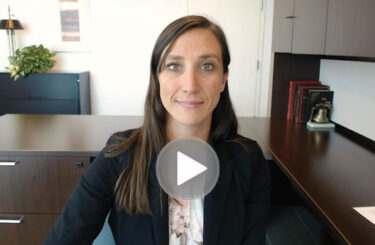Importance of Beneficiary Designations
By Ashley L. Hawley
September 6, 2022
Almost any type of asset you might have can have a beneficiary designation associated with it. Beneficiary designations supersede the designation in a will or trust and your failure to update them can lead to complications when distributing assets. Estate Planning Attorney Ashley Hawley shares why it’s important to pay attention to beneficiary designations and their maintenance in her latest vlog.
Video Transcript
I’m Ashley Hawley. I’m an attorney on Ruder Ware’s Trusts & Estates Team. I want to take a minute to talk about beneficiary designations. Almost any type of asset that you might have can have a beneficiary designation. The easy examples are things like life insurance policies or beneficiary designations on retirement assets. But other types of assets can also have a beneficiary, or a POD or TOD designation, which is payable upon death or “transfer on death” designation – that can be checking and savings accounts, it can also be real estate. The concept of a beneficiary designation is when the account holder passes away, the account will transfer to that beneficiary. Usually, the beneficiary has to fill out some forms and things like that but it will automatically go to that beneficiary. This is a really important concept for estate planning purposes because oftentimes people will update a will or a trust and yet they won’t update their beneficiary designations on their accounts. A beneficiary designation supersedes what your will or trust says as far as where your assets should go. So, if do not update your beneficiary designations, your assets could go to people that you don’t intend them to go to. For example, we see assets going to ex-spouses sometimes or to the estate of a deceased beneficiary. Even more problematic can be sometimes when an asset will go to a child or other beneficiary who might be disabled or on government benefits and so that was maybe not the intention when the beneficiary designation was created. Creating an estate plan – such as creating a trust – and having the trust list that has the beneficiary can resolve some of these issues because the trust can then be amended, or the estate plan can be amended, and then you don’t have to go back and update those beneficiary designations all the time. What I would encourage you to do is if you are meeting with an estate planning attorney you should make sure that they’re aware of all of your assets. And, before you go to that meeting, you should sit down and look at who you have named as your beneficiary on each of those assets to make sure that it conforms with what your goals are. And, as always, Ruder Ware’s Estate Planning Team is here to help if you’d like.
Back to all News & Insights
Disclaimer
The content in the following blog posts is based upon the state of the law at the time of its original publication. As legal developments change quickly, the content in these blog posts may not remain accurate as laws change over time. None of the information contained in these publications is intended as legal advice or opinion relative to specific matters, facts, situations, or issues. You should not act upon the information in these blog posts without discussing your specific situation with legal counsel.
© 2024 Ruder Ware, L.L.S.C. Accurate reproduction with acknowledgment granted. All rights reserved.


